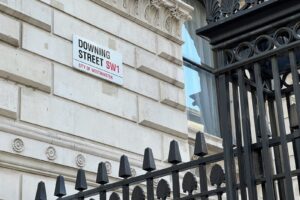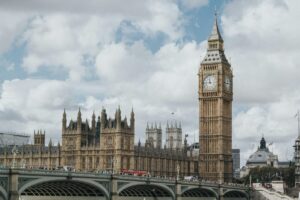UK newswire, Newspage, sought the views of 18 money, mortgage and property experts on the Bank of England’s track record and decision-making over the past 12-18 months in relation to inflation. Not one was impressed. Their thoughts can be found below.
Mike Staton, Director at Staton Mortgages, stated “The Bank of England has slowly tortured homeowners in the UK for the past 16 months. They have consistently kept us all in suspense, causing lenders to not know whether they are coming or going. Threadneedle Street have handled this completely the wrong way. The slight increases they have been making have had little impact on inflation. It’s about time they joined the real world and realised the pain they are causing to the UK population. Andrew Bailey is so far out of touch he is at risk of being the main character in Avatar 3. How can he have the audacity to tell the public to stop asking for pay rises when he is sitting there in his Ivory Tower? It’s easy for him to make these comments whilst taking home his £575k salary. I doubt very much that inflation and interest rate increases are affecting him. I’d like to see him sign up for an episode of Wife Swap to see how he would feel after spending a week in Mansfield living on £1450 a month. His position should be an elected position.”
David Robinson, Co-Founder at Wildcat Law, stated “What we are witnessing is 20th century monetary policy in the 21st century. What happened to innovation and new ideas at the Bank of England? Currently, all we seem to have is an outdated economic playbook written for a bygone era. Current interest rates are only benefiting the banks by increasing their margins. A bit like petrol prices, when the wholesale price goes up decreasing margins, the prices for consumers rise rapidly. We are seeing this with mortgage rates, in many cases rising in mere anticipation of rate rises, yet savings rates are following at a lacklustre pace. Why? Dare I suggest because the bank makes a significant profit on the difference? During the recent low rate period, the difference between savings rates and 2-year fixed rates was less than 2% typically, now they are in excess of 2.5% with many accounts far below this. Natwest, for example, offers a 2-year fixed mortgage at 5.24% and a cash ISA at 1.36%.”
Paul Welch, Founder and CEO at Large Mortgage Loans, stated “The Bank of England has got it wrong. They’ve kept interest rates too low for too long. Sticking to a 2% inflation target, but why? Can’t it be 3% or 4%? Their rigid approach hurts the economy and the pain and suffering this policy is causing is simply too much and too fast. They set targets, then admit they got it wrong. Not helpful. In hard times, we need clear guidance to keep our businesses and households afloat. Also, high street banks are offering paltry rates at 1.5% on savings, even after the Bank of England has jacked up the base rate to 5%. With inflation rising, our savings are actually shrinking. It feels like a double punch with a right hook. We need the Bank of England to wake up, be clear, and fight for us, not against us.”
Scott Gallacher, Director at Rowley Turton, stated “Enough is enough. The Bank of England’s rate hikes are unjustly burdening hardworking families, while inflation, driven by global events and corporate greed, takes its toll. Why should everyday homeowners suffer for factors beyond their control? It’s time for fairness and accountability, not punishing those already stretched thin.”
Ranald Mitchell, Director at Charwin Private Clients, stated “Where’s the Bank of England’s voice, have they lost it? The Bank of England are remarkably muted given the seriousness of the situation and are starting to look like a rabbit in the headlights. We have not seen the worst from mortgage rate increases yet. Our view is that the current market rates, which are much higher than everyone has been used to, will become relative bargains within six months. We expect the base rate to hit 6.5% by June 2024, meaning the premium end of the market will be offering out rates of around 7%. This may not have happened if the Bank had acted sooner. Spare a thought for the mortgage prisoners. As for the High Street banks, they can turn on a dime when hiking rates for borrowers but are like oil tankers when passing on those same hikes to savers.”
Ceri Evans, Manging Director at Remoo Mortgages, stated “The Bank of England has failed to address soaring inflation properly for the past 18 months or so. If you or I continuously underperformed for that period, we would likely be looking for a new job. It’s now time for Andrew Bailey to step aside as change is clearly required at the top. The messaging from the Bank of England has also shown just how out of touch Bailey and the rest of the Monetary Policy Committee are. Telling people who have been through years of austerity, pay freezes or below-inflation pay rises not to seek pay rises now or, worse still, telling people to ‘accept being poorer’ when many are already below the poverty line shows an astonishing lack of understanding, empathy and basic compassion. And this at a time when retailers, energy and utility companies are reporting record profits. How can they get richer when everyone else must accept being poorer? Out-of-touch Andrew is too late, he’s now part of the problem.”
Matthew Jackson, Director at Mint FS, stated :The definition of insanity is to constantly do the same thing and expect a different result. Constantly raising the base rate and expecting the 13th, 14th or 15th raise to have the desired effect seems insane to me. And as a by-product of this, the Bank of England are pushing us towards a housing market crash and a recession, meaning the cure will potentially be more harmful than the actual symptom. P45 for the Governor?”
Justin Moy, Managing Director at EHF Mortgages, stated “The 13 consecutive increases in the base rate show how one-dimensional the Bank of England is about tackling inflation, but that is more the failure of the government to inadequately tool the BofE with actions it can take. Having just one wooden stick to beat the economy with just means you hit that economy harder and harder until it fails. Increasing interest rates affects a disproportionate number of people and borrowers, whereas to control spending and reduce inflation, it needs to be an activity that affects almost all of us, perhaps an increase in VAT. Non-borrowers, so around 65% of the UK, are benefiting from increased savings rates and pensioners are enjoying significant increases in pension income. The base rate increase policy is flawed and will bring a very quick recession as companies start to fail, as well as landlords and homeowners. I would welcome lenders to keep sensible mortgage rates and not worry too much about improving saving rates in the short term.”
Riz Malik, Founder & Director at R3 Mortgages, stated “The current performance of the Bank of England parallels that of Barings Bank, indicating serious room for improvement. A series of thirteen unbroken interest rate increases have barely moved the needle on inflation and risk plunging the economy into greater turbulence. Surely, the country that has given the world esteemed economists like Keynes and Smith should have the capability to select a proficient Monetary Policy Committee. Apparently not.”
Rhys Schofield, Director at Peak Mortgages and Protection, stated “The Bank of England form part of the haven’t-got-a-clue establishment cabal. Inflation isn’t being caused by normal people’s mortgages being cheap. A bungled Brexit, Ukraine, global production issues and greedflation are the real problem. But what are the Government or the Bank of England doing about it? And even if putting rates up was a solution, most people are on fixed rates so rate rises will take time to filter through so how about waiting to see what the impact is?”
Chris Barry, Director at Thomas Legal, stated “I believe that only a third of borrowers have rolled off their historically low interest rate onto a current, much higher rate. The majority of the remaining two thirds will roll off their super cheap deal within the next 12 months so we need to see what impact existing rises have on the mass market before increasing rates further. With this in mind, I am more concerned with the frequency of the rise rather than the amount itself given the Bank of England are not giving the hikes the chance to impact the economy. The Bank of England admitted it should have started increasing interest rates much earlier and this would have had a much improved impact on inflation. Interest rates were allowed to be at an historic low for too long and now we are paying the price.”
Luke Thompson, Director at PAB Wealth Management, stated “The Bank of England’s handling of interest rates has been shambolic both pre- and post-Covid 19. They should have been attempting to normalise interest rates in 2018 and 2019, but never did so which was very short-sighted. But in 2021 they really did excel themselves with their mismanagement. Continuing to flood the economy with cheap money when every man and his dog could see that inflation was becoming an issue simply made the problem worse. Towards the end of 2021 when inflation was already beginning to become out of control a sharp shock to the system with perhaps one or two 1% interest rate rises may well have helped curb the runaway housing market and made people pause for thought. Instead, the first interest rate rise in December 2021 was 0.15%, which seemed to show their heart wasn’t in it. By not being more decisive in 2021 the Bank of England has made this crisis longer and harder than it needed to be. Ultimately Andrew Bailey should pay for this with his job.”
Elliot Culley, Director at Switch Mortgage Finance, stated “Raising interest rates worked in the past when combatting inflation, but we are in a different world now compared to then. Back then there were more mortgages on trackers or variable rates so raising interest rates had a quicker impact. Now, there are far more fixed rates due to such a long time of low interest rates. It takes time for interest rate rises to filter through, but patience doesn’t seem to be a word that’s being used right now. I think we have now gone too far and the result for some mortgage holders and renters will be catastrophic.”
Rob Gill, Managing Director at Altura Mortgage Finance, stated “The Governor of the Bank of England is increasingly resembling a beleaguered football manager. There have been lukewarm statements of ‘confidence’ from the Government and, however difficult the circumstances might be, results have simply not been good enough.”
Austyn Johnson, Founder at Mortgages For Actors, stated “I’m more of a ‘work with what you’ve got’ person than ‘I wish we had X’ person. It’s frustrating working with the constant changes, but moaning about it will get you nowhere. Work hard, work fast and you can do your best for today. Tomorrow, start again. Sometimes that means double research, but it’s that or cases don’t go in. I truly hope the Bank of England understand that their changes cause ripples and instability and right now we need things to stabilise a bit. If this is still going on in the winter, they will need to reassess their plans as they will be hit with a horde of people unable to pay their bills.”
Michelle Lawson, Director- Mortgage & Protection Adviser at Lawson Financial Ltd, stated “I don’t agree with the Bank of England at all right now. I think they need to re-think everything as recent history is proof that we are in unprecedented times and uncharted territory. When inflation has risen before, raising interest rates has combatted this but it doesn’t seem to be working this time around. The rises are only impacting a small percentage of people, namely those that are coming off fixed rates imminently. Those with no mortgages or savings will feel little change other than buying goods. Businesses cannot absorb any more rising costs and taxation. Savings interest rates should rise in line with the base rate rises. The banks can’t have it all ways. Pensions and benefits are index-linked so these will also rise whereas wages and incomes are generally not rising, other than public sector and other indexed pay. The whole thing is a political hot potato all the way up until the General Election.”
Rohit Kohli, Operations Director at The Mortgage Shop, stated “The Bank of England’s silence is reminiscent of a racing driver who’s been leading the pack but suddenly can’t find the right gear. They have a limited set of controls to manage inflation, but a significant part of their role is to keep the confidence of the markets and businesses. Regrettably, it seems they’ve stalled on the track. High Street banks are quick to put the brakes on when it comes to passing on higher interest rates to savers, but they’re stepping on the gas when passing on rate hikes to borrowers. It’s a race that’s unfairly tilted in their favour, and it’s the spectators who are left in the dust.”
Kylie-Ann Gatecliffe, Director at KAG Financial, stated “Raising interest rates was championed as the way to reduce inflation. But the fruits of that labour are yet to be seen. I feel these increases have been a knee-jerk reaction and the initial increases have not been given enough time to have an effect on inflation. Increasing rates, the cost of living crisis and changes for landlords are fuelling what is already a housing shortage in the UK. Many are stuck renting facing rental increases their landlords have had to action due to their mortgages increasing, and their dreams of home ownership are now becoming unachievable due to them having less money to save and now mortgages becoming more expensive. Many of the landlords we look after have sold properties this year, so we need some big changes to keep the market going.”














